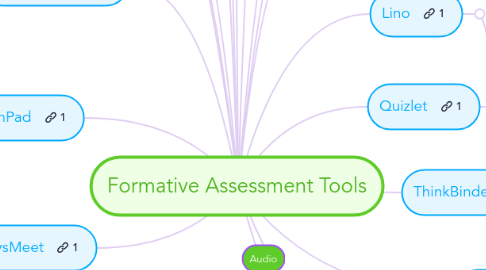Formative Assessment Tools
by Jillian Duehren


1. Classkick
1.1. This app allows teachers to post assignments for students so both the teacher and peers can provide feedback on the assignment. Students can monitor their progress and work
2. Coggle
2.1. A mind mapping tool designed to understand student thinking.
3. ConcepBoard
3.1. This software facilitates team collaboration in a visual format – similar to mind mapping, but using visual and textual inputs. Compatible on tablets and PCs, Conceptboard can work from multiple devices.
4. ExitTicket
4.1. This app offers teachers the opportunity to poll, test, or survey what students know in quizzes called tickets. This tool is best for gathering simple feedback about what students know and don’t know, and is useful for pre-assessment as well as an exit ticket
5. GoFormative
5.1. This online, all-student response system provides teachers the opportunity to assign activities to students, receive the results in real time, and then provide immediate feedback to students.
6. Kahoot
6.1. A game-based classroom response system, where teachers can create quizzes using Internet content.
7. XMind
7.1. A mind mapping software for use on computers and laptops.
8. MindMapping
9. TitanPad
9.1. This unique tool for collaborative work offers 8 colors to choose from so that each contributor may use a different color. You can easily imagine group work, be it peer review or peer editing for starters, can be made interactive
10. TodaysMeet
10.1. This online collaboration tool allows educators to create a “room” in which students can share ideas, answers and thoughts to lectures and lessons. Educators can view student responses in real time for evidence of learning.
11. AudioNote
11.1. A combination of a voice recorder and notepad that captures both audio and notes for student collaboration
12. GoogleForms
12.1. A Google Drive app that allows you to create documents that students can collaborate on in real time using smartphones, tablets and laptops.
13. Jot
13.1. Use like individual whiteboards to express ideas and understanding.
14. Lino
14.1. A virtual corkboard of sticky-notes so students can provide questions or comments on their learning. These can be used like exit tickets or during the course of a lesson.
15. Naiku
15.1. Teachers can easily and quickly create quizzes that students can answer using their mobile device. Great for checking for understanding before and after a lesson.
16. Tablet/Cell phone Use
16.1. Socrative
16.1.1. Engaging exercises and games that engage students using smartphones, laptops and tablets.
